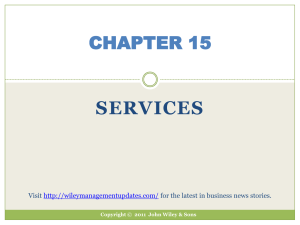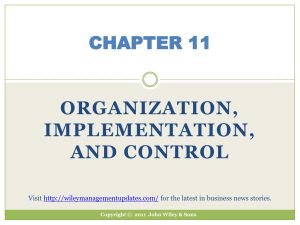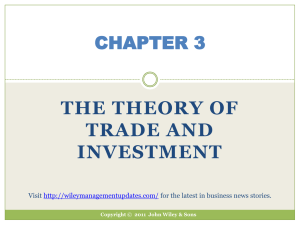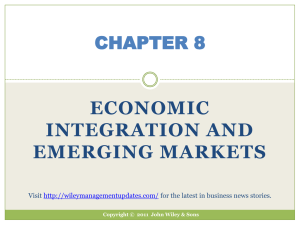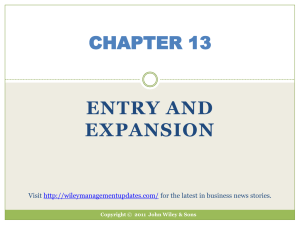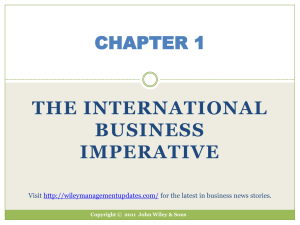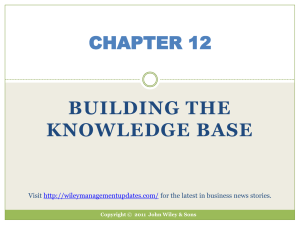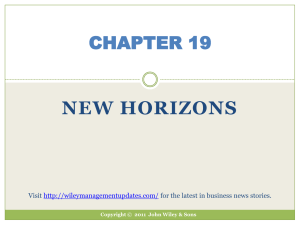Chapter 18
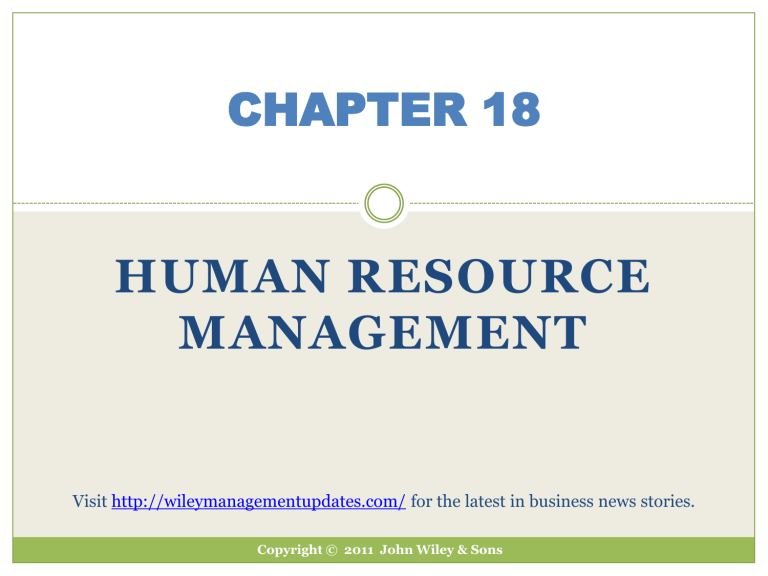
CHAPTER 18
HUMAN RESOURCE
MANAGEMENT
Visit http://wileymanagementupdates.com/ for the latest in business news stories.
Copyright © 2011 John Wiley & Sons
Chapter 18
Learning
Objectives
1.
Assess the effects of culture on managers and management policies
2.
Examine the sources, qualifications, and compensation of international managers
3.
Illustrate the different roles of labor in international markets, especially that of labor participation in management
Chapter 18 2 Czinkota: International Business, 8e
Human Resource Objectives
Recruitment and retention of a workforce
Increase effectiveness of workforce
Activities and skills needed to meet objectives:
Personnel Planning and Staffing
Personnel Training
Chapter 18
Compensation
According to
Effectiveness
3
Understanding of
Labor-Management
Relations
Czinkota: International Business, 8e
Early Stages of Internationalization
Primary need is for an export manager
Marketing or sales manager of the firm typically is responsible for beginning export activities
Will usually hire an export manager from outside rather than promote from within
Knowledge of the product or industry is less important than international experience
Chapter 18 4 Czinkota: International Business, 8e
Advanced Stages of
Internationalization
Overseas assignment categories:
CEO
Functional
Heads
Trouble-
Shooters
White- or
Blue-Collar
Workers
Ability to attract talent around the world can be a competitive advantage
Company needs:
A network of global specialists to work together
To develop clear career paths for oversees managers
To coordinate and leverage resources across borders
Chapter 18 5 Czinkota: International Business, 8e
Japanese Firms Seeks
Outside Leadership
Japanese firms tend to be very insular, and executives typically stick with one company for life and bosses are promoted from within. In
June 2010, U-Shin, a mid-sized maker of car parts, began looking outside for a new president. The company is looking for a young,
English-speaking boss to replace its current president who has been in place for over 30 years. U-Shin is also taking the highly unusual step of running newspaper advertisements to attract candidates.
U-Shin's atypical move suggests that the need to break with tradition and internationalize management is beginning to be recognized down at the level of medium-sized business, the heart of Japanese industry.
Source: http://www.economist.com/blogs/asiaview/2010/07/japanese_corporate_culture?fsrc=scn/fb/wl/bl/openingup
Chapter 18 6 Czinkota: International Business, 8e
Interfirm Cooperative Ventures
New Management Challenge
Global competition is forging new cooperative ties between firms from different countries
Tasks needed:
Assign and motivate people so venture will meet goals
Strategic management of human resources
Chapter 18 7 Czinkota: International Business, 8e
Sources for Management Recruitment
Sources for recruiting include:
Within the
Company
Other
Product or Region
Group
External
Talent
Local
Managers
Expats
Criteria for deciding between expatriates and local managers
Availability and quality of talent pool
Corporate policies
Environmental constants on the legal, cultural, and economic fronts
Chapter 18 8 Czinkota: International Business, 8e
Recruitment During the
Internationalization Process
During the export stage, outside expertise is sought at first, but the firm then begins to develop its own personnel for international operations
When international operations are expanded, a recruitment dilemma may occur when dealing with internal recruitment of young managers
Chapter 18 9 Czinkota: International Business, 8e
Selection Criteria for Overseas
Assignments
The role of factual cultural knowledge, or knowledge obtainable from specific country studies, has been widely debated
Area expertise includes a knowledge of the basic systems in the region or market for which the manager will be responsible
The oversees manager must progress from factual knowledge to interpretive cultural knowledge, which is an acquired ability to understand and appreciate the nuances of foreign cultural traits and patterns
Chapter 18 10 Czinkota: International Business, 8e
Criteria for Selecting Managers for
Overseas Assignment
Competence
• Technical knowledge
• Leadership
Ability
• Experience, Past
Performance
• Area Expertise
• Language
Adaptability
• Interest in Overseas
Work
• Relational Abilities
• Cultural Empathy
• Appreciation of New
Management Styles
• Appreciation of
Environmental
Constraints
• Adaptability of
Family
Personal
Characteristics
• Age
• Education
• Sex
• Health
• Marital Relations
• Social
Acceptability
Chapter 18 11 Czinkota: International Business, 8e
Focus on Culture: The GLOW
Network at Siemens
S i e m e n s h a s e m b r a c e d d i v e r s i t y a s a f u n d a m e n t a l p e r s p e c t i v e f o r i t s b u s i n e s s o b j e c t i v e s . A s p a r t o f t h e c o m p a n y ’ s f o u r - p r o n g d i v e r s i t y i n i t i a t i v e ,
S i e m e n s h a s l a u n c h e d t h e G l o b a l L e a d e r s h i p
O r g a n i z a t i o n o f W o m e n ( G L O W ) . C r e a t e d t o p r o a c t i v e l y r e c r u i t a n d r e t a i n h i g h l y q u a l i f i e d w o m e n , G L O W i s a n e t w o r k d e d i c a t e d t o e n l a r g i n g t h e c o n t r i b u t i o n o f w o m e n t o S i e m e n s ’ s b u s i n e s s .
Chapter 18 12 Czinkota: International Business, 8e
The Selection and Orientation
Challenge
Adaptability screening usually involves interviewing both the overseas candidate and the candidate’s family to determine how well they are likely to adapt to another culture
An orientation program facilitates new workers with their roles and prepares them for overseas assignments
Chapter 18 13 Czinkota: International Business, 8e
Culture Shock
Pronounced reactions to the psychological disorientation when spending an extended time in a new environment
Stages include:
Initial
Euphoria
Enjoying the novelty, largely from the perspective of a spectator
Irritation/
Hostility
Experiencing cultural differences
Adjustment
Adapting to the situation
Biculturalism or cases of “going native” are possible
Re-Entry
Chapter 18
Returning home to face a possibly changed home environment
14 Czinkota: International Business, 8e
Psychological and Physical
Symptoms of Culture Shock
Culture shock is a condition that affects expats when they move overseas. Here's how to recognize the physical and psychological symptoms of culture shock.
Psychosocial Symptoms:
• Sadness and loneliness
• Homesickness
• Idealizing the home culture
Physical Symptoms
• Fatigue and malaise
• Generalized aches and pains
• Increase in illness or accidents
Source: http://workabroadtravel.suite101.com/article.cfm/psychological-and-physical-symptoms-of-culture-shock
Chapter 18 15 Czinkota: International Business, 8e
Repatriation
Returning home may invoke mixed feelings
Reverse cultural shock may emerge
Find a place in corporate hierarchy
Family must give up their special status
Four step process for repatriation planning:
Assessment of foreign assignments in terms of environmental constraints and corporate objectives
Preparation of the individual for an oversees assignment
Communication during the tour on developments at headquarters
Reorientation upon reentry
Chapter 18 16 Czinkota: International Business, 8e
Compensation
A firm’s expatriate compensation program has to be effective in the following areas:
Home-country salary
Assignment-location costs
Home-country equivalent purchasing power
Compensation of the manager overseas can be divided into two general categories:
Base-salary allowances
Salary-related allowances
Chapter 18 17 Czinkota: International Business, 8e
Base Salary and
Non-Salary-Related Allowances
Base Salary Allowances
• Depends on qualifications, responsibilities, and duties
• Cost of Living Allowance
(COLA)
• Foreign Service Premium
• Hardship Allowance
• Housing Allowance
• Tax-equalization Plan
Non-Salary-Related
Allowances
• Relocation allowance
• Mobility allowance
• Home sale or rental protection, household storage or shipment
• Automobile protection
• Travel expenses
• Temporary living expenses
• Education allowance
• Medical expenses
• Home leave
Chapter 18 18 Czinkota: International Business, 8e
Labor Participation in Decision Making
Rights of information, consultation, and codetermination develop on three levels:
The shop-floor level, or direct involvement
The management level, or through representative bodies
The board level
Self management – Independent decision making
Codetermination – Employees are represented on supervisory boards to facilitate communication and collaboration
Works Council – Workers and managers who participate in decisions affecting them
Chapter 18 19 Czinkota: International Business, 8e
Improvement of Quality of Work Life
Efforts to improve personal and professional development:
Team building is aimed at enhancing the cohesiveness of a department
Quality circles are groups of workers who meet regularly to discuss issues related to productivity
Work scheduling involves preparing schedules of when and how long workers are at the workplace
Flextime allows workers to determine their own starting and ending times
Chapter 18 20 Czinkota: International Business, 8e
The Role of Labor Unions
Role varies from country to country
Investment decisions can be guided by union considerations
Union challenges due to internationalization:
Power of the Firm to
Move
Production
More
Difficult to get
Financial
Data
Insufficient
Attention to Local
Issues
Difficulty in being
Heard by
Decision
Makers
Chapter 18 21 Czinkota: International Business, 8e
Labor Union Puts
GM French Factory Plan in Doubt
In July 2010, a plan to maintain operations at a General Motors plant in eastern France was in doubt after a labor union refused to sign a deal to freeze salaries and cut working days.
Three other unions agreed to the deal after more than 1,000 of 1,150 workers voted to accept conditions set by the Detroit-based carmaker to keep the plant open.
General Motors had said it needed all four unions to agree for it to complete the repurchase of a plant it put up for sale in 2008 to help raise cash and avoid bankruptcy at the height of the financial crisis.
Source: http://www.ibtimes.com/contents/20100723/labor-union-puts-gm-french-factory-plan-doubt.htm
Chapter 18 22 Czinkota: International Business, 8e
Focus on Ethics: Labor Unions
Attack Nestlé in Russia
W o r k e r s a t a N e s t l é f a c t o r y i n t h e U r a l c i t y o f P e r m c a m e t o t h e R u s s i a n c a p i t a l t o c o m p l a i n a b o u t m a n a g e m e n t ’ s r e f u s a l t o e n g a g e i n n e g o t i a t i o n s t o i n c r e a s e r e a l w a g e s . D e s p i t e t h e p u b l i c p r o t e s t s ,
N e s t l é r e f u s e d t o m e e t t h e w o r k e r s ’ d e m a n d s , s t a t i n g t h a t w a g e s a r e “ a b o v e t h e i n d u s t r y a v e r a g e i n t h e c i t y ” . I n J u n e 2 0 0 8 , N e s t l é a g r e e d t o f o r m a l l y r e c o g n i z e t h e u n i o n ’ s f u n d a m e n t a l r i g h t t o n e g o t i a t e w a g e s .
Chapter 18 23 Czinkota: International Business, 8e
Human Resource Policies
Anticipate the demand for various skills and have programs to ensure availability of employees when needed
HR Strategies:
Often workers are imported when there is a shortage
Sometimes the company must bring the local labor force up to a desired level of competency
Compensation packages are shaped by:
Culture Legislation
Collective
Bargaining
Taxation
Characteristics of the
Job
Chapter 18 24 Czinkota: International Business, 8e
